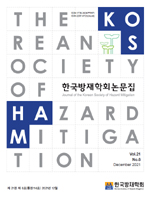도로유출수로 인한 하천변 토양오염 연구
A Study of Soil Pollution by Road Runoff
- 한국방재학회
- 2. 한국방재학회 논문집
- 21권6호
-
2021.12333 - 339 (7 pages)
-
DOI : 10.9798/KOSHAM.2021.21.6.333
- 92

대표적인 비점오염원인 도로유출수는 하천 수질을 심각하게 악화시키는 것으로 알려져 있다. 이에 수질오염을 저감하기 위하여 도로유출수를 토양에 침투시키는 방안이 도입되고 있다. 그러나 고농도의 중금속과 석유계총탄화수소를 포함하고 있는 도로유출수는 토양오염을 야기할 수 있다. 본 연구에서는 도로유출수가 유입되는 지점의 토양시료를 채취하여;인근의 오염되지 않은 토양과 카드뮴;납;아연 등 중금속과 석유계총탄화수소 농도를 비교하였다. 그 결과 도로유출수가 유입되는 토양의 중금속 농도가 인근의 오염되지 않은 토양에 비해 최대 21배 높게 나타났으며;토양오염우려기준을 초과하는 것으로 나타났다. 결론적으로 도로유출수의 토양방류가 토양을 심각하게 오염시키고 있으며;이를 막기 위해서는 도로유출수의 직접적인 토양방류를 막아야 할 것으로 판단된다.
Road runoff;a representative non-point source pollution;is known to seriously deteriorate the river water quality. In order to prevent river contamination due to road runoff;road runoff is infiltrated into the soil along the river. However;road runoff containing high concentrations of heavy metals and total petroleum hydrocarbons (TPH) can cause soil pollution. In this study;soil samples were collected at the point where road runoff flows;and the concentrations of heavy metals;such as cadmium;lead;and zinc;and TPH in them were compared with that in uncontaminated soil. Consequently;the concentration of heavy metals in the soil into which the road runoff flows was up to 21 times higher than that of the nearby uncontaminated soil. In conclusion;the discharge of road runoff into the soil seriously pollutes the soil. Therefore;direct discharge of road runoff to soil should be prevented to prevent soil pollution.
1. 서론
2. 연구방법
3. 결론
(0)
(0)